Hong Kong protesters hold firm on Wednesday deadline for China
September 30, 2014 -- Updated 1930 GMT (0330 HKT)
Source: CNN
STORY HIGHLIGHTS
- Wednesday is a national holiday; crowds expected to swell
- Protest leader says Hong Kong chief executive's response "totally nonsense"
- China blocks CNN's reporting about Hong Kong in mainland China
- 59 people have been injured and 89 arrested since protests started
Are you there? Share images, but stay safe.
Hong Kong (CNN) -- It's Wednesday in Hong Kong, and pro-democracy protests there are expected to grow because many people are off work for China's National Day.
The day also brings a deadline that demonstrators have set for the Chinese government to meet their demands to let Hong Kong residents elect their own leader. It looks unlikely China will bend, so it's unclear what will happen next.
For a week, Hong Kong residents have said that they want more freedom and won't back down until they get it. They were supposed to be able to freely elect their next chief executive in 2017. That was considered momentous in Hong Kong because its current chief executive isn't elected by the people but by a 1,200-strong committee stacked with Beijing loyalists.
Last month, China announced that it would allow only Beijing-vetted candidates to participate in the 2017 election, sparking widespread anger.
"Both sides in this dispute appear to be digging in their heels and unwilling to find a compromise," said CNN's Ivan Watson, who stood amidst the tens of thousands on the street late Tuesday and Wednesday morning.
Hong Kong and Chinese officials have called the protests illegal.
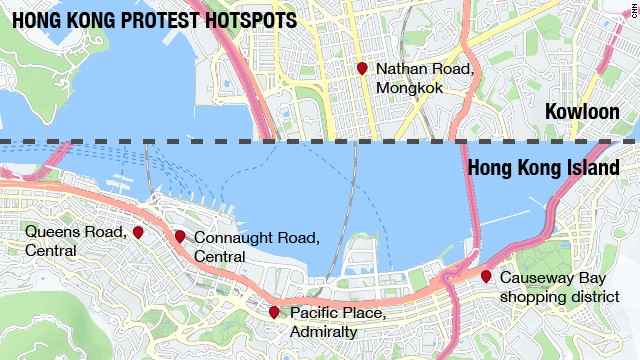
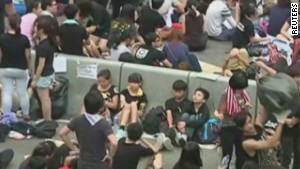
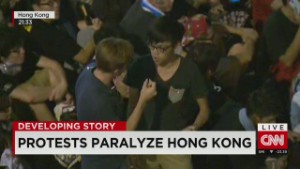
Dawn is still hours away -- Hong Kong is 12 hours ahead of New York -- but protesters were well settled on the main road leading into the city's central business district Tuesday. Some put on masks, protective goggles and plastic raincoats, bracing for a potential rematch with police, who fired tear gas at them two days ago.
Earlier Tuesday, Hong Kong Chief Executive C.Y. Leung urged protesters to clear the roads, saying they might pose a risk to public safety.
"The main roads are used by fire trucks and ambulances. They now have to take a detour, so we urge the society to think about this," Leung said. "I now urge them to call a stop to this."
Even a brief but intense rain didn't deter anyone. Many simply held up umbrellas that have become a symbol of the movement, shields used to protect them from the tear gas police have fired at them. Students have sent CNN iReports about their experiences.
"I normally like to post to Instagram, but China has blocked Instagram, and they don't want the protests out there," said Suraj Katra, who shared a photo of dozens of young people sitting on the street.
Another iReport captured a collective of umbrellas.
"I'm really, really angry with police for using violence," said Grace Cheng, a 21-year-old recent college graduate who has been dunking hand towels in buckets of cold water and giving them to protesters to keep them cool Tuesday as temperatures soared.
She said she was worried the police would use heavier force. "We can't really stop them," she said.
Calls for Leung's resignation grew louder as night wore on Tuesday.
"All the candidates will be pre-selected by Beijing. ... It's more or less like North Korea," protest organizer Chan Kin-man said.
"But we are an international city. We have a younger generation who have been taught about civil rights, political rights. And we want our words to be heard."
Why are the protesters irate?
The demonstrations are the largest in Hong Kong since it was handed back to China by the British in 1997.
Leung said Tuesday that China will not back down.
"Based on the basic law, we will be able to have one-person, one-vote universal suffrage," Leung said. "I understand this universal suffrage is somewhat different to what the public thinks it would be. But this is based on the basic law. We still want to remain peaceful, calm and think what the best is for Hong Kong."
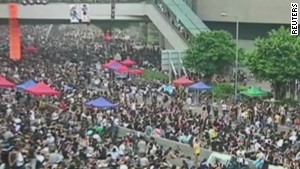
At the United Nations building in New York Tuesday, CNN's Richard Roth asked China's deputy U.N. ambassador what he thought of the protests.
Wang Min replied, "What, where? Hong Kong is part of China," and then walked away.
United Nations Secretary-General Ban Ki-moon recognizes that the protests are a "domestic matter," a spokesman told CNN, but he "urges all stakeholders to resolve differences" in a peaceful way in line with democratic principles.
Back in Hong Kong, student Alex Chow, who organized the demonstrations, called the response of the city's chief executive "totally nonsense."
Chow accused Leung of being at the command of Beijing. "The current situation is totally out of C.Y. Leung's control," Chow said.
"Actually, the government is under great pressure," he continued, "and we will demand and call for more people" to protest in the coming days.
Still, other protesters believe that if Leung steps down, the tense atmosphere in Hong Kong will calm, but there will still be a push for democracy, said 42-year-old Novelle Wong.
"There will be another C.Y. coming up," Wong said. "This ordeal will happen all over again."
The demonstrations gained momentum after winning the support of Occupy Central with Love and Peace, a protest group that was already planning to lead a campaign of civil disobedience this week against the Chinese government's decision on choosing the next person to lead Hong Kong.
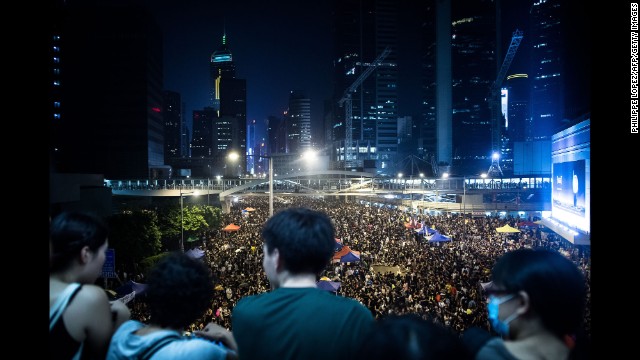
What about counterprotesters?
Not all Hong Kong residents support the popular protest movement. There are 7 million people who live in the city.
Pro-Beijing groups like The Silent Majority for Hong Kongsay the activists will "endanger Hong Kong" and create chaos.
They have held their own rallies against Occupy Central and run advertising campaigns in local media to highlight their fears.
Businesses worry that any campaign targeting the city's financial district will harm Hong Kong's reputation as a safe and stable place for commerce.
The protests have brought widespread disruption to the heart of one of Asia's biggest financial centers.
On Tuesday, 37 branches or offices of 21 banks were closed, the Hong Kong Information Services Department said. It said ATM services were also disrupted in some areas.
And 157 schools closed Tuesday due to the protests, the Hong Kong Education Bureau said.
In an indication that authorities don't expect the demonstrations to end soon, the Hong Kong government said it was canceling the city's annual National Day fireworks display on Wednesday because of the protests.
More violence ahead?
"The mood here has generally been very, very calm, very peaceful," CNN's Andrew Stevens said Tuesday.
It was a different scene two days ago when police hurled 87 tear gas canisters into the crowd.
"We gave them enough of a chance to leave, and this included warnings," Assistant Police Commissioner Cheung Tak-keung said Monday. "But when they failed, we had to use force."
At least 59 people have been injured, a Hong Kong government spokeswoman said. At least 12 police officers were among the injured, authorities said.
Police say they've arrested 89 people since protests began, accusing them of forcible entry into government premises, disorderly conduct in public, assaulting police officers and obstructing police.
Some analysts say they see little hope of compromise between the committed protesters and the Chinese Communist Party, which remains notorious for its ruthless suppression of pro-democracy protests in Beijing's Tiananmen Square in 1989.
"I see no way the Chinese government can tolerate what is happening in HK. Greatly fear this will end badly," tweeted Mike Chinoy, a senior fellow at the U.S.-China Institute at the University of Southern California, who covered the Tiananmen crackdown for CNN.
Chinese authorities apparently tried to restrict the flow of information into the mainland about what was happening in Hong Kong.
On Tuesday, China blocked out reporting on Hong Kong in mainland China, CNN Beijing correspondent David McKenzie said.
Earlier, censors had blocked access to Instagram after images of the protests flooded the photo-sharing app.
"Everybody is in completely unknown territory," said Roderic White, an associate fellow at London-based Chatham House. "How these things end, we just don't know."
CNN's Jethro Mullen reported from Hong Kong. CNN's Holly Yan reported and wrote from Atlanta. CNN's Catherine E. Shoichet, Richard Roth, Vivian Kam, Chieu Luu, Katie Hunt and Hilary Whiteman contributed to this report.
No comments:
Post a Comment